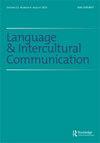大学水平学生在课堂互动中对EMI的立场、负面情绪的沟通和第二语言咒骂
IF 2.2
1区 文学
0 LANGUAGE & LINGUISTICS
引用次数: 0
摘要
摘要:本研究纵向考察了大学生在英语媒介教学(EMI)中的立场、负面情绪交流和第二语言咒骂。16名就读于韩国某大学英语授课课程的研究生参与了这项研究。研究工具包括课堂观察、反思性日记写作和深度半结构化访谈。结果显示,在小组讨论中有三次,每次都有一名学生用韩国语表达了他对EMI的语言思想和愤怒,并用英语咒骂。这些情况分别发生在一个学生反对EMI,一个学生反对EMI之前自己支持它,以及一个学生反对EMI面对另一个学生的支持。影响这些场合的因素包括他们的老师除了特定学科的词汇外,还特别关注一般词汇(这是这些学生的一个共同因素),EMI固有的挑战,面对的挑战,以及老师过度的学术推动。本文章由计算机程序翻译,如有差异,请以英文原文为准。
University-level students’ stances, communication of negative emotions, and L2 swearing with respect to EMI during classroom interaction
ABSTRACT This study longitudinally examined university-level students’ stances, communication of negative emotions, and L2 swearing with regard to English-medium instruction (EMI). Sixteen graduate students enrolled in an English-medium course in a university in Korea participated in the study. The research instruments were classroom observations, reflective journal writing, and in-depth, semi-structured interviews. The results indicated that there were three occasions, during small group discussions, on each of which one student articulated her/his language ideologies against EMI and expressed her/his anger in Korean, and swore in English. These occasions occurred due to a student’s opposition to EMI, a student’s opposition to EMI preceded by her own support for it, and a student’s opposition to EMI faced with another student’s support for it, respectively. What affected the occasions included their teacher’s idiosyncratic focus on general vocabulary in addition to subject-specific vocabulary (a factor common to these students), and challenges intrinsic to EMI, face, and the teacher’s excessive academic push.
求助全文
通过发布文献求助,成功后即可免费获取论文全文。
去求助
来源期刊

Language and Intercultural Communication
Multiple-
CiteScore
3.00
自引率
47.40%
发文量
50
期刊介绍:
Language & Intercultural Communication promotes an interdisciplinary understanding of the interplay between language and intercultural communication. It therefore welcomes research into intercultural communication, particularly where it explores the importance of linguistic aspects; and research into language, especially the learning of foreign languages, where it explores the importance of intercultural perspectives. The journal is alert to the implications for education, especially higher education, and for language learning and teaching. It is also receptive to research on the frontiers between languages and cultures, and on the implications of linguistic and intercultural issues for the world of work.
 求助内容:
求助内容: 应助结果提醒方式:
应助结果提醒方式:


